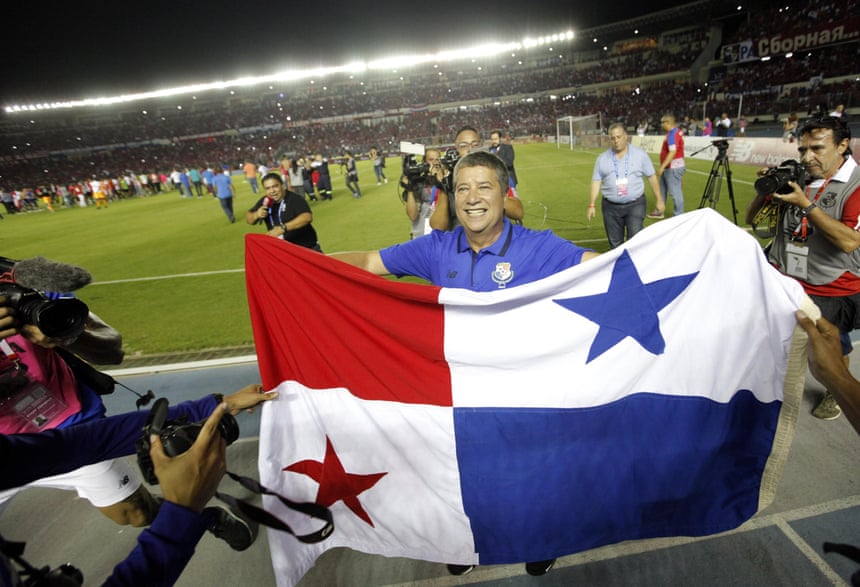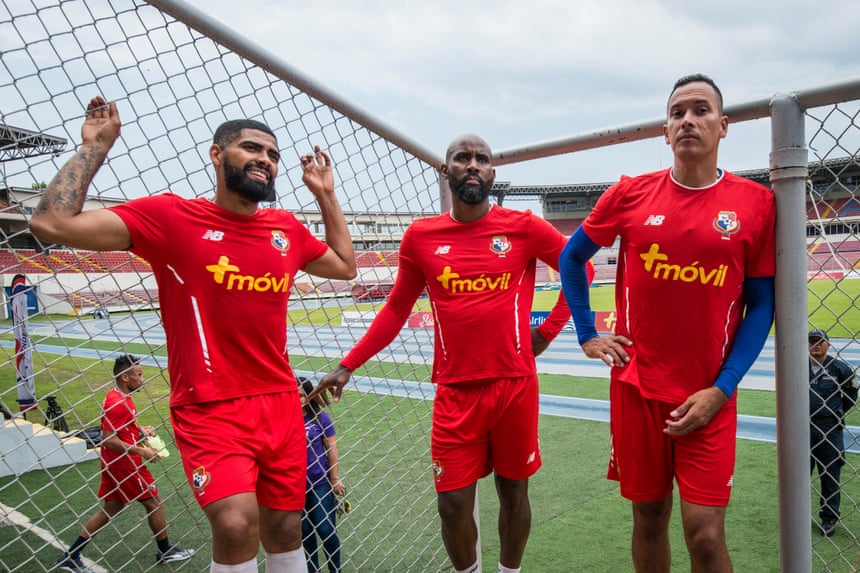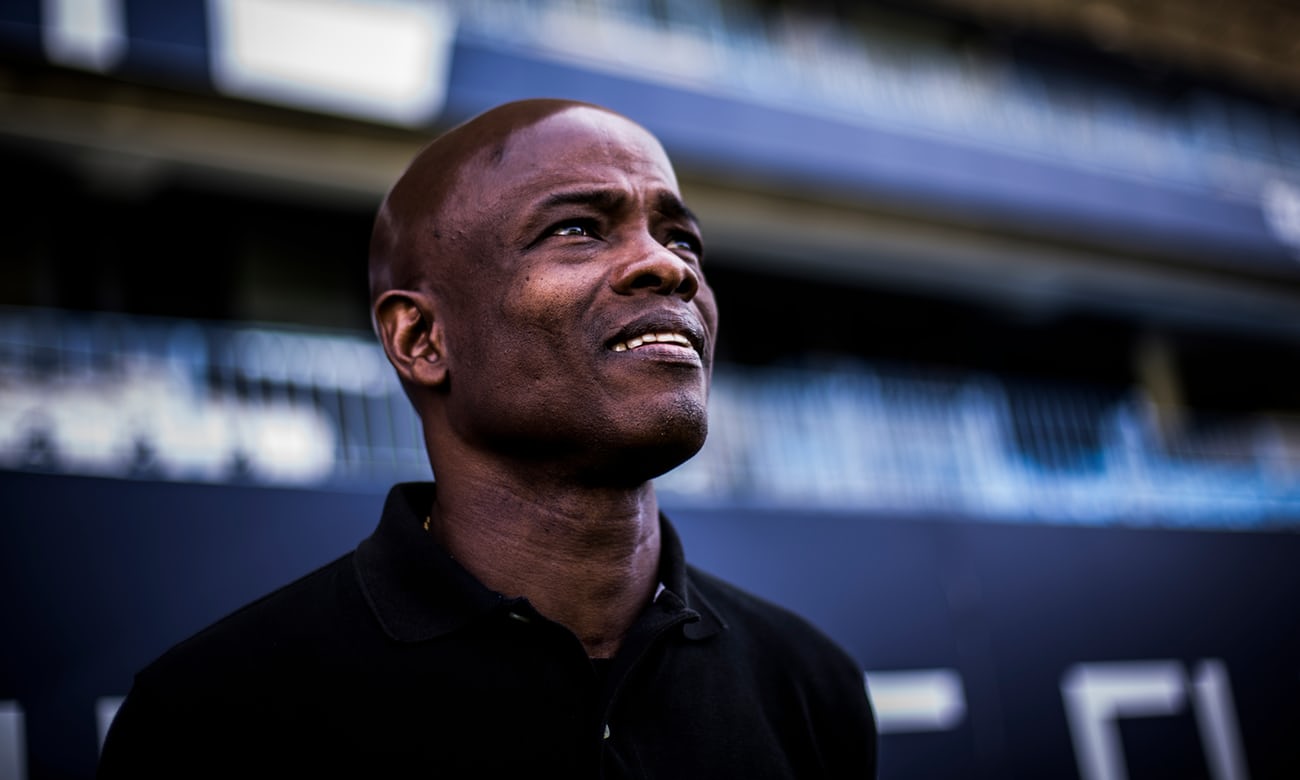Panama’s greatest ever player discusses what it means for them to be at the World Cup, four years after narrowly missing out.
He had seen them sobbing four years earlier and now he watched in silence as the tears returned, but it was different this time. Román Torres had just scored the late, late goal that took Panama to the World Cup for the first time in their history; 5,000 miles away, the country’s finest ever footballer was watching on television, struggling to contain his emotion. “I couldn’t shout as much as I would have liked because I was in Spain and it was the middle of the night: I would have woken the neighbours,” Julio Dely Valdés says, laughing. “It’s hard to explain; the feeling was immense. I knew what they’d been through
Few could grasp quite like him what this meant. Dely Valdés played in Argentina, Uruguay, France, Italy and Spain, but never at the World Cup. His older brother Armando, who died in 2001, played in Argentina, Uruguay and Israel and had a stadium in Colón named in his honour. And Julio’s twin Jorge followed him to Argentina then Uruguay’s Nacional, before playing in Chile and Japan. Julio, with 44 caps and 15 goals, and Jorge retired from international football together in October 2005. Julio scored over 120 goals at Paris Saint-Germain, Cagliari, Oviedo and Málaga; of Panama’s likely squad this summer a few are in Europe – Slovenia and Romania, and in the B teams of Deportivo la Coruña and Gent. Yet this generation has achieved something unthinkable when he played.
Only, it is his generation too; these are his players, and he embarked on this journey with them. It took an 87th-minute goal to take Panama to the World Cup at the expense of the USA in 2018; in 2014 they had been denied the chance to go to a World Cup play-off by a last-minute goal from the USA. Julio Dely Valdés was their coach, Jorge his assistant. Most of the players from back then will be in Russia, redemption delivered. “The dressing room that day …” Dely Valdés starts saying. He stops, puffs out his cheeks. “Sad,” he adds, slowly. “All around the room were people sobbing.”
Dely Valdés became Panama manager in 2006, basically because there was no one else. “They’d sacked the coach, there were two games coming up and it was like: ‘Julio can do it.’ My second game we went to Peru, where we’d never won, where we’d been beaten 7-0, and won 0-2. ‘Ooh!’ Hahaha. ‘What’s going on here?’ So, I stayed and took charge for five games, before going to Spain.”

“The second time was after [English coach] Gary Stempel in 2009,” he continues. “I was lucky: Jorge was Stempel’s assistant and stayed on with me, so I knew what I’d find and I took what I’d learned in Europe. Technically, Panamanian players are good, strong and quick, but undisciplined in every sense – on and off the pitch.”
Dely Valdés was an unusual Panamanian, then. The son of a local government secretary and canal worker, “punctual, serious, responsible people”, in their son’s words, he takes discipline seriously. “I was lucky I had the authority of who I was [as a player] and I used that. I said: ‘I won’t allow this, this, or this.’ I told eight or nine key players, leaders, and when there was the slightest act of indiscipline …” He clicks his fingers. “I cut heads. And the others think: ‘If he’s cut the head off this guy who’s a leader … oooh!’”
Dely Valdés tells the story of the team bus leaving without Luis Tejada, the star striker, who didn’t show up and was left out. Although he returned later and, aged 36 now, will be in Russia, the way Dely Valdés tells it, that was an important battle won. When it came to the biggest battle, though, the moment they could have made history, they lost, qualification for 2014 dramatically denied.
“Sadly, we had to go through that,” Dely Valdés, 51, says. “But, then, maybe we needed to go through that. It made the national team stronger. Having had it so, so close … then so far. It was the 91st minute when America scored and they weren’t playing for anything, but we lost the game, eh. We did. We were the ones that didn’t know how to manage the situation.
“That game will always be in my head, it’s still going around. Four days before, you play Mexico and lose in the last minute so you’ve got the experience, you’ve been warned. Then we play the US, we’re winning 1-0 at half-time and I tell the players: ‘Remember this: there will be a time when we’ll need to be behind the ball, every one of us, defending to the death.’ The US equalise, we go 2-1 up. It’s the 80th minute, you’re winning 2-1, you have to think: ‘This is that moment.’ But when we scored to make it 2-1, the players were crying. We were like: ‘It’s not finished! You’ve got a World Cup place, but you have to protect it with your life.’”

And then it happened. Panama’s dream evaporated. Dely Valdés walked away. “I’ll be back, I’m sure, but it had been hard, three tough years, and I wanted to go. We’d developed a lot: a Copa del Oro [Gold Cup] final, another semi-final, so close to the World Cup. We went back to the hotel and when we said goodbye, I said: ‘Boys, this had to happen. It’s sad but we have to learn from this.’ And we did, I really believe that.”
Four years on Torres, who has been in the national team for 12 years, raced through to score the winner, knocking out the US, who lost 2-1 in Trinidad & Tobago when a draw would have put them in the finals. “I was so happy. I still talk to lots of them – with Jaime Penedo especially, [but also] [Felipe] Baloy, [Adolfo] Machado, Torres … We’ve come a long way and this is huge. People have always liked football but it wasn’t the main sport. We’ve had boxing world champions, players in Major League baseball, basketballers in the NBA. It’s a long process: when I went, I brought back what I learned. Look at what Rommel Fernández did at Valencia, Albacete, Tenerife; my brother in Argentina; René Mendieta in Mexico. And now [Blas] Pérez, Tejada, all these players. Kids look at them now. Maybe we opened the door to them; now they’re opening the door to others.
“This should be the start of something: Panama at the World Cup! We’ve taken a giant leap, it’s the country’s biggest sport now, and we have to keep building. I’ll be going to Russia with my family, wearing the shirt. I’m going to enjoy it; the whole of Panama will.”
Source: Sid Lowe for The Guardian
